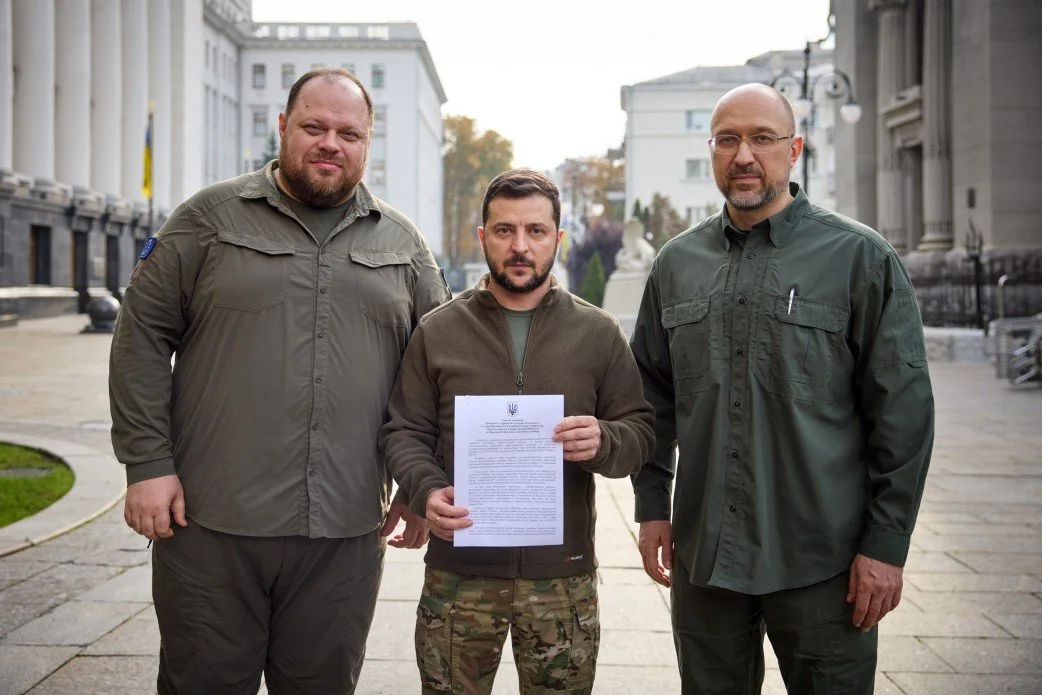Diplomatic Escalations in the Russia-Ukraine War
Ukraine's President Volodymyr Zelenskyy (center), Prime Minister Denys Shmyhal (right), and Parliament Speaker Ruslan Stefanchuk (left) pose with a request for membership in the NATO alliance in Kyiv, Ukraine on September 30, 2022. Ukrainian Presidential Press Service/Handout
October 6th, 2022 marked over two hundred and twenty five days into the Russia-Ukraine war. As the war wages on, diplomatic developments indicate Russia’s limited international support is dwindling, and Europe is unsettled by an attack on its energy infrastructure.
In early October, the Russian Federation passed legislation recognizing the annexation of four Ukrainian regions: Donetsk, Luhansk, Kherson, and Zaporizhzhia. The move presumably aims to validate Russian claims of victories in the war, which are far and few between, as Ukraine makes significant territory gains. In fact, Russian forces lack full control over any of the four regions it now claims, and the Kremlin has yet to formally designate its borders of the regions. Beyond expressing the weakness of Russia’s claim to the territory, this development complicates all facets of international interaction, as Russia cannot define its own national borders.
The United States introduced a United Nations Security Council (UNSC) resolution to condemn the annexations during the recent General Assembly, but Russia vetoed the resolution. However, no other state voted with them; ten nations voted in favor, while four abstained. Two of the abstaining states, India and China, have maintained close relations with Russia and criticized Western sanctions, but their tolerance seems to be waning. Leaders from both countries are concerned by the improbability of a quick end to the enduring war, marked by the recent mobilization of almost 300,000 Russian troops.
India’s Minister of External Affairs referred to the trajectory of the war as a matter of “profound concern for the international community,” and referenced the reports of military transgressions, saying the council should “reflect on the signals we are sending on impunity.” Many more countries are disturbed by Putin’s aggressive threats of nuclear escalation. Beijing’s ambassador specifically referenced this in a comment about the seriousness of “countries’ legitimate security concerns.” Earlier this month, President Putin himself said that Chinese President Xi Jinping had expressed concerns about the conflict to him, despite the countries establishing a "no-limits'' strategic partnership earlier this year. These shifts mark a turning point in Russia’s standing on the international stage, seeming to finally become diplomatically isolated.
The same day that Putin announced the planned annexation, President Zelenskyy signed the application for Ukraine to join NATO. The mutual-defense alliance does not currently allow acceptance of a country in an active conflict, but it is unlikely that NATO membership is Zelenskyy’s immediate goal. More likely, the act served two strategic purposes. First, as a way to undercut Russia’s claims of victory; a primary goal of Russia’s invasion and war on Ukraine was to keep the country from joining NATO, which Russia saw as a direct threat to its own area of influence. Second, Ukraine views this application as a primer for a more reasonable request for expanded security guarantees while Ukraine’s NATO status is pending, specifically the drafted Kyiv Security Compact. It is also possible that Ukraine could begin accession discussions with NATO, a time in which states work to “demonstrate their ability to meet the obligations and commitments of possible future membership,” according to NATO’s website. This would not guarantee them membership, but demonstrate the nation’s persistent conviction of its own self-determination and belief in future victory over Russia.
Zelenskyy likely fears his allies are becoming fatigued with a long war and the potential of Russian nuclear escalation. Entrenching security guarantees in a formal agreement, whether a compact or NATO membership, assures him support and disincentivizes Russia from nuclear action.
Already on edge because of Russia’s diplomatic aggression, many NATO states are alarmed by a recent attack on European energy infrastructure. Nord Stream 1 and 2, natural-gas pipelines linking Russia and Europe, ruptured in at least three places on September 26th, 2022. The Swedish National Seismic Network registered two powerful tremors that day, later classified as explosions, which they determined to be the cause of the leaks. Many European leaders, including European Commission President Ursula von der Leyen, have said the leaks are the result of sabotage, although no one has yet assigned blame.
The pipelines were not in use because of Russia and Europe’s energy standoff, therefore the leaks have no impact on Europe’s current energy supply. Regardless, they heighten the stress over the European energy crisis, as seen by the 5% rise in natural-gas prices in Europe after the leaks were reported.
As of now, there is no party that clearly stood to immediately gain from damaging the pipelines, although many suspect Russia. Sabotage could have been the Kremlin’s way to emphasize the vulnerability of Europe’s energy infrastructure, particularly as a new pipeline opened between Norway and Poland, designed to reduce reliance on Russian energy. However, harming the pipelines eliminates Russian leverage over Europe, preventing them from using gas deliveries as a bargaining tool. Regardless of intended outcomes, the pressurized gas in the pipes is now bubbling up to the surface of the ocean, and the released methane will contribute to global warming.
President Putin is attempting to broadcast Russian dominance through the annexation of Ukrainian land, but his limited support is dwindling, hastened by his threats of nuclear escalation. President Zelenskyy rebuts Russia by formally applying for NATO, seeking more definitive security guarantees for Ukraine. Europe fears further attacks on their energy infrastructure following sabotage of the Nord Stream gas pipelines by a yet undetermined actor. As Russia is becoming increasingly isolated, and may become more desperate, the international community could be forced to unite to prevent the possibility of nuclear escalation.

